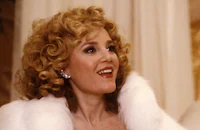From The Mixed-Up Files of Mrs. Basil E. Frankweiler

Brief Synopsis
Cast & Crew
Fielder Cook
Mike Hammett
Johnny Doran
Peter Turgeon
Linda Selman
Robert Packer
Film Details
Technical Specs
Synopsis
A young brother and sister run away and live in New York's Metropolitan Museum of Art.
Director
Fielder Cook
Cast
Mike Hammett
Johnny Doran
Peter Turgeon
Linda Selman
Robert Packer

Madeline Kahn
Georgann Johnson
George Rose
Richard Mulligan
Sally Prager

Ingrid Bergman
Donald Symington
Brucie Conover
Crew
Eric Albertson
Donald Devor
Blanche Hanalis
Victor J Kemper
E L Konigsburg
Charles G Mortimer
Philip Rosenberg
Peter Scoppa
S Mark Smith
Ed Stewart
John Strauss
Videos
Movie Clip



Film Details
Technical Specs
Articles
From the Mixed-Up Files of Mrs. Basil E. Frankenweiler
But if the earlier part of From the Mixed-Up Files of Mrs. Basil E. Frankweiler is disappointing for Bergman fans, it offers other pleasures, chief among them the inventiveness of the story, the location photography, and a delightfully daffy cameo by a rising young actress. The story was the author's second published book, and was inspired in part by a newspaper article she read about a statue that the Met acquired at a bargain price, which curators believed was the work of Leonardo da Vinci, and by her own visits to the museum with her own children. The book became so popular that the museum published a special issue of their children's newsletter identifying the locations for the artworks featured in the story, and warning that it would be impossible to camp out in the galleries like the two children in the story did. For the first time ever, the museum shut down for one day to allow the filmmakers to shoot inside. Other scenes shot on location included Macy's department store, and various New York City street scenes.
Bergman wasn't the only prominent actress whose appearance in From the Mixed-Up Files of Mrs. Basil E. Frankweiler was brief. In the opening credits, Madeline Kahn's single scene is billed as "special appearance by..." It was Kahn's third feature, after making a big comic impact in featured roles in two hit films, What's Up, Doc? (1972) and Paper Moon (1973). Her scene as a harried teacher taking students on a museum tour feels improvised, and is wonderfully effective. Kahn had briefly worked as a teacher while she was trying to break into show business, and drew on her own experience for the part.
By the time she appeared in From the Mixed-Up Files of Mrs. Basil E. Frankweiler, Ingrid Bergman had been an international movie star for 35 years. She had been adored, showered with awards, reviled, ostracized, and welcomed back to Hollywood. She also had successes on the stage on Broadway, in Paris, and London. She had nothing left to prove. According to biographer Donald Spoto, Bergman told friends she took the role not only because she was offered a lot money to play a small part, but "because she saw the character role...as a marvelous opportunity to satirize the only roles offered to women in their fifties -- women in their eighties, arid and acrid crones who are finally revealed to be old dears."Bergman was 57, and required a frowzy white wig and aging, unflattering makeup to play the role. She makes a grand if unsteady entrance, tottering down a staircase leaning heavily on a cane, wearing an old-fashioned black dress and a diamond choker. Her voice is querulous, but strong. Her manner is imperious, but she soon begins to warm toward the children who have intruded on her self-imposed solitude, sharing a comically cutthroat card came with Jamie, and finally divulging the secret of the angel statue with Claudia, whom she recognizes as a kindred, adventurous spirit.
Reviews praised Bergman's portrayal. "With her tart, emphatic delivery and instinctive maternal warmth, Miss Bergman is totally charming," according to Kathleen Carroll of New York's Daily News. Also in the Daily News, the usually acerbic Rex Reed wrote, "Even disfigured behind all that white hair and rubber cement, Ingrid Bergman is a beautiful and dignified symbol of nobility." Vincent Canby of the New York Times was less enthusiastic, calling the film "one of those G-rated movies about children, not as they are but as they appear in television commercials....They play out adult dreams in adult gestures....Mrs. Basil E. Frankweiler, described as a wealthy recluse... is played...by Ingrid Bergman wearing a white wig and long black dress of the sort usually worn by the male lead in Charley's Aunt." Bergman's next film role, Murder on the Orient Express (1974), was more substantial and won her a best supporting actress Oscar.
Director: Fielder Cook
Producer: Charles G. Mortimer Jr.
Screenplay: Blanche Hanalis, based on the novel by E.L. Konigsburg
Cinematography: Victor J. Kemper
Editor: Eric Albertson
Costume Design: Beatrice Dawson, Linda Wayne Howard
Art Direction:Philip Rosenberg
Music: Donald Devor
Principal Cast: Ingrid Bergman (Mrs. Frankweiler), Sally Prager (Claudia Kinkaid), Johnny Doran (Jamie Kinkaid), George Rose (Saxonburg), Richard Mulligan (Mr. Kinkaid), Georgeann Johnson (Mrs. Kinkaid), Madeline Kahn (Schoolteacher), Donald Symington (Museum Director), Linda Selman (Museum Secretary)
105 minutes
by Margarita Landazuri

From the Mixed-Up Files of Mrs. Basil E. Frankenweiler
Quotes
I wanted to be different. I wanted to be different.- Claudia
And did running away from home made you different?- Mrs. Frankweiler
No.- Claudia
Trivia
Miscellaneous Notes
Released in United States 1973
Released in United States on Video February 13, 1991
Released in United States September 1973
Released in United States 1973
Released in United States on Video February 13, 1991
Released in United States September 1973 (Premiered at New York's Radio City Music Hall in September 1973.)













